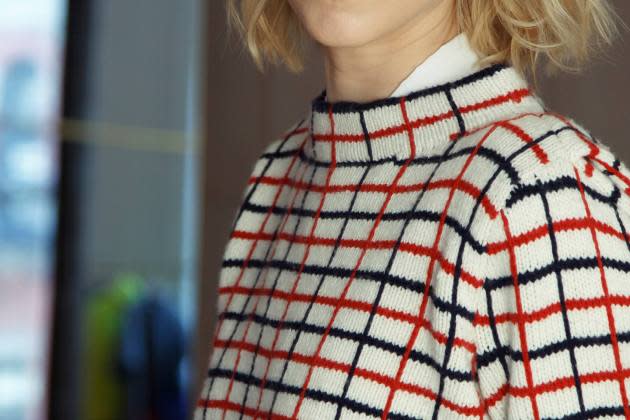EXCLUSIVE: Paravel’s Indré Rockefeller Launches ‘The Circularity Project’

PARIS — Fashion executive-turned-climate-activist Indré Rockefeller is launching The Circularity Project to champion circular design strategies in the fashion industry.
The initiative led by the new nonprofit kicks off Tuesday with a salon-style discussion between industry executives and designers, cohosted by the CFDA and Ralph Lauren at the brand’s Polo Bar in New York City.
More from WWD
The group aims to educate and empower designers to minimize waste and ingrain circular design thinking into their creative process.
Former U.S. president of Delpozo and cofounder of sustainable luggage brand Paravel, Rockefeller went back to school to immerse herself in climate science. She joined Columbia University’s Climate School in 2021, earning a masters degree as part of their first cohort.
Her Instagram bio declares her a “wannabe climate scientist” and she posts a series of chatty, humorous and explanatory videos between fashion and social content.
Over time the executive and entrepreneur, who also held positions in editorial at Vogue and retail at Moda Operandi, started to take a deeper look at the impact of the fashion industry. Once she started working on her own sustainable brand at Paravel, Rockefeller understood the challenges and opportunities of lower-impact design.
During her masters’ studies she did a deep dive into the numbers, hitting on the stat that 80 to 90 percent of a garment’s environmental impact can be determined in the design stage. Armed with her new education and past experience working with creatives, Rockefeller wanted to rethink the fashion industry’s role.
“Designers can have a real power to redefine fashion,” she said. “If they can approach any design thinking about the opportunity to design garments to last longer, to be taken apart, to be made to be recycled, basically creating pieces that are designed for multiple lives, they could play a major role in transforming the industry footprint.”
For Rockefeller, who was enrolled in the climate course while still running Paravel, the dual role was a personal and professional balancing act. But it gave her new ideas on how to communicate the issues to people in the industry who aren’t versed in the science.
Enter The Circularity Project.
The organization will be set up to give designers toolkits and case studies to understand how to incorporate these characteristics at the design stage, with the mission to generate creative solutions and build a community of like-minded designers and executives.
“Ultimately I’m a big believer that if we work together as an industry, we have a better chance of addressing the industry’s environmental footprint,” she said.
Coach’s Stuart Vevers, AnOnlyChild’s Maxwell Osborne, Collina Strada’s Hillary Taymour, and Bode’s Emily Adams Bode Aujla will be among the speakers. Each will discuss different aspects of their approach to circularity and design, said Rockefeller.
“Circularity as a concept is layered and complex, and it’s a goal that involves a complete shift in thinking across organizations and industries. I’m not saying this is a simple solution that can be solved singlehandedly by designers. But if we plant seeds of creative inspiration, designers can take on the role of innovators and advocates that would lend to creative solutions,” she said.
Since fashion creates trends, designers have the potential to lead on bigger cultural ideas than what is “in” or “out” in any given season.
“Designers hold an important role within the heart of [the industry] and to start with that aspect of it — of what decisions a designer can make that don’t necessarily require upstream or downstream collaboration but really cross their desk and empower them to feel like they have a role and a voice in it,” she said.
A longer-term goal for the new organization is to give designers access to additional community, and be a hub for information and resources.
Rockefeller noted that while younger designers are building these kinds of systems from the ground up in their brands, more established ones and larger companies are attempting big shifts to evolve their practices. “So this is really about people, and about letting a designer start where they are,” she said. “No one has the perfect solution. It’s not just a box that you can tick.”
Following the New York event, The Circularity Project aims to host similar events in London, Paris, Milan and Tokyo in the coming months.
Best of WWD

